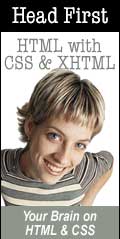
Been reading a new book on XHTML/CSS. O'Reilly claims its books in the Head First series represent a "learning experience." (not a reference)
Normally I just want the facts .. stripped of extraneous info. (For example, I've never cared for preachers who infuse their sermons with much emotion, which I feel is manipulative.) So it surprises me I'm actually enjoying this book.
The introduction (12-pages) addresses the book's theory on learning. Below I've listed the key points (many of which I've long subscribed to, and tried to implement here).
Their main theory centers upon the notion that » your brain craves novelty .. continuously searching for something unusual (like a hungry tiger, hiding in the bushes, waiting to eat you).
Your brain, consequently, does everything it can to stop ordinary thoughts from interfering with your attention to "things that matter" (hungry tigers, fire, etc.).
So you need to trick your brain into thinking the material you're learning is impotant. "How?" you ask. Good question.
••••• today's entry continues below •••••
- Slow down. The more you understand, the less you have to memorize. Take time to ponder the implications of what you're learning.
- Take notes. Research shows physical activity increases learning.
- Read before bed. Your brain needs free time to transfer info learned into long-term memory.
- Drink lots of water. The brain works best in a well-hydrated body.
- Talk out loud. Speaking activates a different part of your brain.
- Take a break if you feel overloaded. Past a certain point, your ability to learn diminishes, and you may actually hurt the process.
- Create something. Apply you new knowledge to a project. [Something I've already decided to do.]
- Pictures help you learn better than text, cuz the brain is tuned for images (not text).
- Redundancy is good (saying the same thing in different ways) cuz it suggests to your brain that the info is important.
- Using people is good, cuz your brain pays more attention to people than things.
- Stories are good, cuz your brain craves narrative.
- Exercises are good, cuz your brain remembers things it has to work at.
- A conversational style is better than a lecture style, cuz it makes you feel like you're involved (in a conversation), and will try to keep up. The brain doesn't care if it's involved in a conversation with a book.
- Emotions are good, cuz people remember what they care about.
- Strange, eye-catching, unexpected material is good, cuz your brain pays attention to things out of the ordinary (hungry tiger, hiding in bushes).
I love this kinda stuff .. (even more than XHTML/CSS). Head First books use the latest research in neurobiology, cognitive science, and learning theory.
Regarding item #4 above, on drinking water .. I've heard it's also good to keep your blood sugar up, as your brain burns glucose when working. For this, I've always sucked on Nips (coffee flavored) during class.
